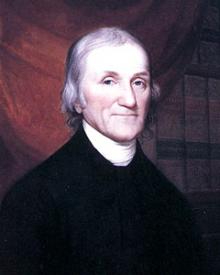- Home
- Archival Material
- College History Projects
- Subject-Based Digital Projects
Joseph Priestley (1733-1804)

Joseph Priestley was born on March 13, 1733 to Jonas and Mary Swift Priestley. Jonas Priestley was a dyer and dresser of woolen cloth. Joseph's mother died when he was young, so much of his early education was provided by his aunt, Sarah Keighley. He went on to study at a local grammar school, and in 1751 entered Daventry Academy.
In September 1755 he obtained a parish in Needham Market, Surrey, and he was finally ordained on May 18, 1762. He was called as a tutor to Warrington Academy and taught modern history and languages from 1762 to 1767. He married Mary Wilkinson on June 23, 1762, shortly after beginning work at Warrington. For reasons regarding Mary's health, the two moved to Mill Hill in 1767 where Joseph obtained another congregation.
Lord Shelburne (William Petty) hired Priestley as his librarian in 1772, retaining his services until 1780. Priestley then moved on to the New Meeting congregation in Birmingham where he remained until the Birmingham Riot of July 1791. During the riot, Priestley's home and laboratory was burned, while he and his family narrowly escaped. The family settled in London for a few years, but sailed for the United States in 1794.
Joseph Priestley was a well known figure in his day, and therefore was greeted with much attention when he reached America. After being received in New York, Priestley moved on to Philadelphia, a city of which he was not very fond. He decided to move to central Pennsylvania and purchased land in Northumberland, where his son, Joseph Priestley, Jr., had already settled. In 1795 Henry, Joseph and Mary's youngest son, died at the age of 18. Mary herself passed away the following year, both deaths seriously affecting Priestley.
For the ten years that he lived in the United States, Joseph Priestley continued to write, perform experiments, correspond with friends and colleagues, and occasionally preach to Unitarian congregations. He died on February 6, 1804 at home in Northumberland.
Joseph Priestley is perhaps best known for his discovery of oxygen while performing experiments with gases in 1774. Ultimately, Priestley identified nine distinct gases, including carbon dioxide and nitrous oxide. He is credited with developing a sound method for infusing carbon dioxide into water, thus establishing himself as the father of carbonation. He met Benjamin Franklin in 1765 in London, at which time Franklin reputedly encouraged Priestley to continue experiments he was conducting with electricity. Priestley also met Antoine Lavoisier, apparently in Paris in 1774 shortly after isolating oxygen. It is believed that Lavoisier expanded on Priestley's experiments in this area.
Science, however, was really only ever a hobby of Priestley's, his primary interest being theological studies. He was forever reexamining doctrine, constantly publishing his opinions, occasionally preaching, and often times altering his religious views. He produced a voluminous body of writing, publishing on subjects as varied as politics and philosophy, electricity and other scientific matters, history and biography, and, of course, theology. He can be considered, in many ways, to have been a Renaissance man of his age.
Date of Post:
2005